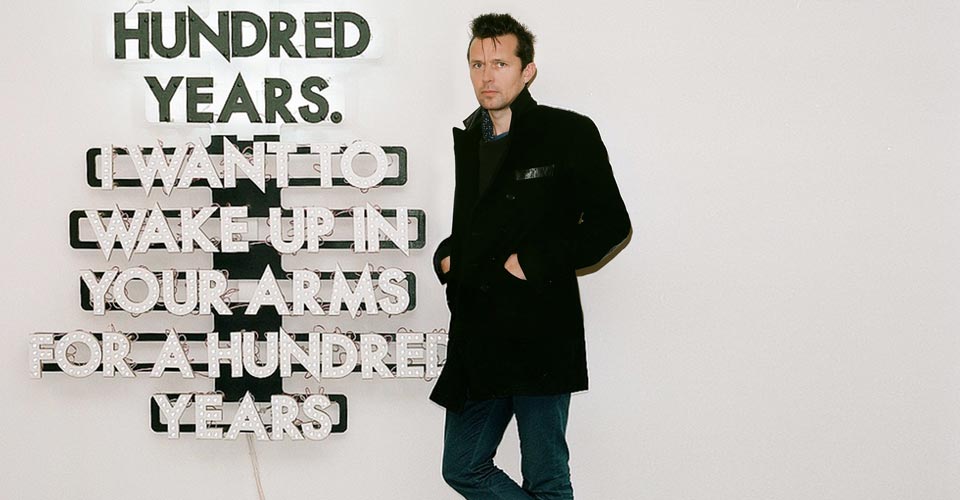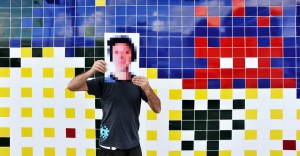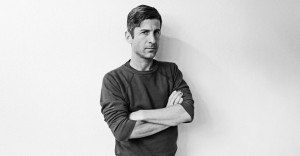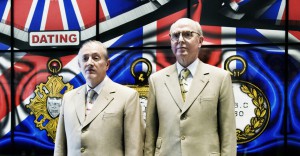Robert, do you think combining poetry with art is the only way a poet can make a living these days?
(Laughs) T.S. Eliot wrote “The Waste Land,” which is in my view unarguably the most important poem of the twentieth century and the guy still had to have a day job. It’s horrible. Poets have been really underpaid. I’d like to have a go at campaigning for poets to be paid a living wage. You should be able to make money publishing poetry books just like making records.
Writing songs is kind of the modern version of poetry anyways.
You can actually learn a lot from studying the way lyric writers write. Have you ever seen Tom Waits on the Letterman show?
No, but there is a great video of him on an Australian Talk Show where you can tell that Heath Ledger used him as his inspiration for the Joker.
He’s fucking great on Letterman because they’ve got a really good vibe together somehow. Letterman asks him, “Tom, you’ve been suggested as the last in a long line of the romantic poets that starts with Keats and Shelley and ends up with Bob Dylan and Leonard Cohen and then you. Do you see yourself as part of that tradition?” And he says, “You know what I do? If I do a song and it’s kind of shit, I put the name of a town in it and then if it’s still not good I put food in it because everyone can relate to that. Everyone can imagine themselves somewhere eating lunch.” If you look at Tom Waits’ songs, that sense of place is really important. So you get good tips from those guys.
Why is it important for you to write your own poems for your art pieces instead of just quoting lyrics from songs like some other artists do?
I think that’s the really fun part, you know. In a certain way it’s something that I’ve always done. I honestly feel like my work comes from my adolescent bedroom poetry. You know, those poems you write when you’re 14 and listening to The Cure and everything seems melodramatically difficult in your 14-year-old life. I think I’m the kind of kid that just kept on writing that stuff and then just turned it into a career! (Laughs) But I do think of that as being the fundamental part of the work in a sense. I like it.
How do they usually come about? Do you sit down and write or do they just come to you?
It’s the kind of thing you sort of think about the whole time. You actually try to put your mind in that zone pretty much perpetually and then sometimes it works. Sometimes you get nothing and sometimes you get good stuff. You quite often get stuff at like 2 o’clock in the morning. The stuff you write slightly drunkenly can be unintelligible the next day or you can have really great stuff. You wake up in the morning and kind of see what you’ve got. I quite like that process.
Often there is a certain melancholy to your poems, is that still rooted in the music you were listening to as a kid or is that just the mood you get in when you are drunk at 2 in the morning?
I’ve always really liked that kind of music. I think melancholy is really interesting, because it is the creation of beauty from sadness. It sort of gives you something to do with your sadness, something positive, something pleasurable to make out of sadness. So I really like melancholy, I really like pathos, I like those things in almost all art forms. I like them in music, in painting, in writing, in sculpture. I tend to like the pathetic and the melancholic.
You place these poems on commercial billboards, often in bright LED lights. Do you intend to catch people’s attention when they least expect it?
I’m definitely interested in hijacking advertising space for a different kind of conversation. I think it’s really interesting to use that space for a sort of interior voice. A voice in the private sphere. When I started putting my art on billboards, people told me, “You can’t put a hundred words on a billboard. No one will read that.”
Normally you are supposed to be able to read the whole thing in like 7 seconds.
Exactly. Those are the codes of advertising, right? It’s got to have like a sexy picture and an eight-word statement that you can totally digest in seven seconds. But of course, completely ignoring and breaking those codes actually really works because people stop.
Jenny Holzer also works with text and billboards. Was she an inspiration for you?
The whole thing started because I thought what Jenny Holzer does is fucking great. She’s done things like renting a space on the electronic billboard during the Super Bowl that puts out the message: “Raise boys and girls the same way.” Which is absolutely fucking brilliant, it’s a great statement to macho-sportsman America. Yes, so that was totally inspired by Jenny and by the way Félix González-Torres used billboards as well. They unapologetically took the personal into the public space. I didn’t come up with that, they came up with that.
Before you could afford to rent a billboard I guess you were just taking them without asking?
Sure, but I never really got into trouble. In the beginning when I started doing it sort of illegally I even had some people that owned billboards, this company in London called Jack Liberties, offering me billboards saying, “Put your poetry on it, we’re kind of into it.” So that’s been a really happy conversation so far.
What about the conversation with the public?
The questions they ask you and the responses you get are really interesting and really nice and usually really encouraging as well. You understand that ordinary people are quite able to get their head around contemporary art. It’s not that fucking complex. It’s a system of signs, it’s not like trying to understand really complicated algorithms or maths. It’s like pretty simple stuff, contemporary art, and it’s not beyond the intellectual reach of most people. (Laughs)
Have you thought about buying billboards yourself and putting up permanent pieces?
Yeah I have, actually. I’ve even thought about buying apartments that have got billboards on them, you know? Because then I think you can probably claim them back from the company that you rent them out to. I’ve thought about that. But I’m not really the sort of homeowner type of guy. But I also don’t want to bore people. It’s a bit funnier to pop up in unexpected places.
Isn’t it your dream to buy a simple wooden house? I read that somewhere.
I have a fantasy about a really big, simple wooden house on the land. I think about that the whole time kind of, like this really simple, humble yet sublime, silent, hilltop retreat. Of course I never even go to the countryside. I spend my entire life, 100% of the time, in cities, either in London or Paris or New York or Berlin. I’m absolutely never even at the beach.
Not even for vacation?
I don’t even like going on holiday, it makes me really nervous. I get really jumpy and depressed if I go on a beach holiday. So I think I’m the kind of person who likes to be in cities and think about countrysides.
How do you pick the cities that you display your work in?
Thus far I’ve pretty much worked in the cities that I like and have wanted to hang out in. The work I’ve done has basically been in London, Paris, Berlin, and New York. I just got invited to do like 20 billboards in L.A., which I’m going to do.
L.A. is a great city for billboards.
But I get a bit depressed in L.A. because people feel they have to behave as though they are much happier than they actually are. It’s very odd. So you can’t really tell if anyone is sincere and I can get really depressed there because no one sounds like they mean what they’re saying. It’s fucking nuts.
Maybe you don’t like it because L.A. is too close to the beach?
I might not spend too much time there. A lot of my work is about the city in general – the city as an archetype, the city as a phenomenon – and so it can kind of go anywhere.
Return to Top

Short Profile
Name: Robert Montgomery
DOB: 1972
Place of Birth: Chapelhall, North Lanarkshire, Scotland
Occupation: Artist
Robert's latest exhibition is a group show with Lawrence Weiner and Ian Hamilton Finlay at AJLart Berlin





















Ha, me too:
I have a fantasy about a really big, simple wooden house on the land. I think about that the whole time kind of, like this really simple, humble yet sublime, silent, hilltop retreat. Of course I never even go to the countryside. I spend my entire life, 100% of the time, in cities, either in London or Paris or New York or Berlin. I’m absolutely never even at the beach.